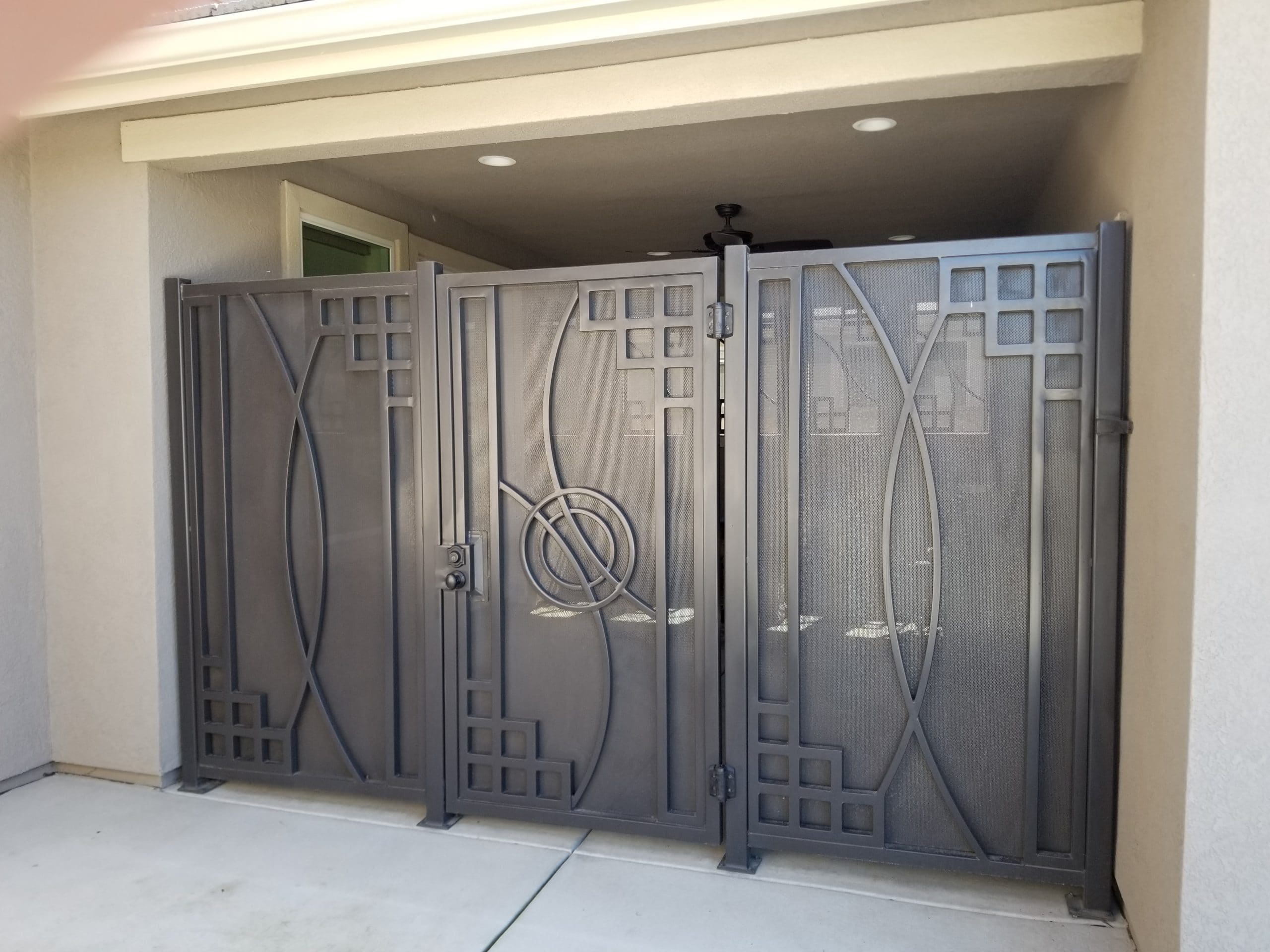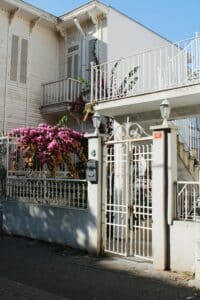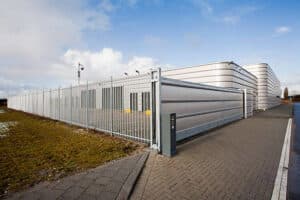Building a custom wrought iron gate for your home or property can provide both beauty and security. When selecting a wrought iron gate, it’s important to ask the right questions to ensure you get a gate that meets your specific needs and preferences. In this blog post, we will guide you through the essential questions to ask when designing and building a custom wrought iron gate.
Click on a question to skip to the section:
- What are my design options?
- What type of finish should I choose?
- What level of security do I require?
- How will the gate be installed?
- What is the maintenance required?
- What is the cost and timeline for building my custom gate?
- Do you offer a warranty or guarantee on your work?
- How will the gate be installed?
1. What are my design options?
Wrought iron gates come in various styles and designs, offering you a wide range of options to choose from. When considering the design of your custom wrought iron gate, it’s essential to take into account both aesthetics and functionality. Here are some factors to consider when exploring design options for your wrought iron gate:
a. Architectural Style: Choose a gate design that complements the architectural style of your home or property. Whether you have a traditional, modern, or eclectic property, wrought iron gates can be tailored to suit any style. Make sure your chosen design enhances your home’s overall appearance and blends seamlessly with the existing architecture.
b. Customization: Wrought iron is a highly versatile material that allows for endless customization. Discuss with your fabricator the various design elements available, such as scrolls, finials, pickets, and decorative panels. You can also incorporate custom artwork, monograms, or logos to create a truly unique and personalized gate.
c. Functionality: While aesthetics are important, your gate should also serve its intended purpose. Consider how the gate will be used – for pedestrian access, vehicle access, or both – and ensure the design accommodates these needs. Additionally, think about any specific requirements such as privacy, security, or ease of use.
d. Automation: If you want the convenience of an automated gate, discuss with your fabricator the different automation options available, such as swing or sliding gate operators. The design of your wrought iron gate should accommodate the necessary hardware and mechanisms for smooth and reliable operation.
e. Integration with Surrounding Elements: Your wrought iron gate should harmonize with other elements on your property, such as fencing, railings, and landscaping. Consider how your gate design will work in conjunction with these features to create a cohesive and visually appealing exterior.
f. Local Regulations and Restrictions: Before finalizing your design, check with your local authorities or homeowners’ association (if applicable) for any restrictions or guidelines that may impact your gate design. Some communities may have specific requirements regarding gate height, style, or materials.
By carefully considering these factors and working closely with your fabricator, you can create a custom wrought iron gate that perfectly suits your needs, preferences, and home’s architecture. Remember that a well-designed wrought iron gate not only adds beauty and elegance to your property but also increases its value and curb appeal.
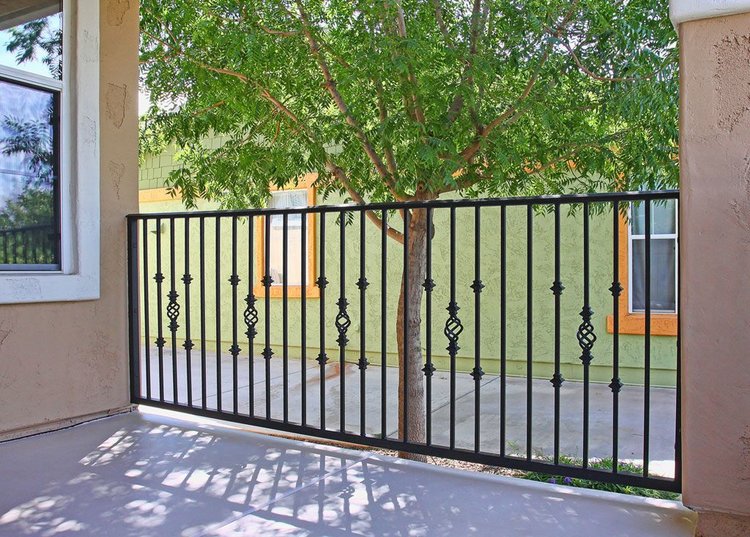
2.What type of finish should I choose?
Selecting the right finish for your custom wrought iron gate is crucial to ensuring its long-lasting beauty, durability, and resistance to the elements. The finish can significantly impact the gate’s overall appearance and how well it withstands weathering, rust, and corrosion. Here are some common finishes for wrought iron gates and factors to consider when choosing the best option for your project:
a. Powder Coating: Powder coating is a popular finish for wrought iron gates due to its durability and low maintenance requirements. This process involves applying a dry powder (typically a mixture of pigments, resins, and additives) to the iron surface, which is then heated and cured to create a strong, protective layer. Powder coating offers excellent resistance to rust, chipping, and fading, and is available in a wide range of colors and textures to suit your design preferences.
b. Paint: Painting your wrought iron gate allows for a high degree of customization in terms of color and sheen. High-quality paint can provide a durable, long-lasting finish when applied correctly. However, painted wrought iron gates may require more frequent maintenance, such as touch-ups or repainting, to keep them looking their best and protect against rust and corrosion. When choosing paint, opt for a high-quality, rust-inhibiting product specifically formulated for metal surfaces.
c. Patina: A patina finish can give your wrought iron gate an aged, antique appearance that can add character and charm to your property. Patina finishes are created through a chemical process that accelerates the natural oxidation of the metal, resulting in a unique, weathered look. Patina finishes can vary widely in color and texture, depending on the specific chemicals and techniques used. It’s essential to discuss with your fabricator the desired outcome and maintenance requirements for a patina finish, as some patinas may need to be sealed or treated to preserve their appearance and protect the metal beneath.
d. Clear Coat: A clear coat finish can be applied to wrought iron gates to protect the metal and enhance its natural appearance. Clear coats are typically a transparent, weather-resistant layer that provides protection from rust, corrosion, and UV damage without altering the color or texture of the metal. Clear coats can be applied over other finishes, such as patina or paint, to add an extra layer of protection and prolong the life of the finish.
e. Combination Finishes: In some cases, you may wish to combine different finishes to achieve a specific look or effect. For example, you might choose a powder-coated base color and then add a patina or paint to create highlights, accents, or a distressed appearance. Discuss your vision with your fabricator, and they can guide you through the process of selecting and applying the appropriate combination of finishes for your wrought iron gate.
When choosing the finish for your custom wrought iron gate, consider factors such as aesthetics, durability, maintenance requirements, and the local climate. A knowledgeable and experienced fabricator can help you select the best finish for your project, ensuring your gate remains beautiful and functional for years to come.
3. What level of security do I require?
The locking mechanism and access control system you choose for your custom wrought iron gate will have a significant impact on its overall security, convenience, and user experience. There are numerous options available, ranging from traditional manual locks to advanced electronic systems. Here are some essential factors to consider when selecting the most suitable locking mechanism and access control options for your wrought iron gate:
a. Manual Locks: Manual locks are a simple and cost-effective option for securing your wrought iron gate. These may include padlocks, deadbolts, or slide bolts. When choosing a manual lock, look for a high-quality, weather-resistant product designed for outdoor use. Consider the ease of use and whether the lock can be easily defeated or bypassed.
b. Keyless Entry Systems: Keyless entry systems offer added convenience and security by eliminating the need for physical keys. These systems may include digital keypads, electronic card readers, or biometric scanners (such as fingerprint readers). Keyless entry systems can often be programmed to allow for multiple users, temporary access codes, or time-restricted access, making them a versatile option for various applications.
c. Remote Control Access: Remote control access systems allow you to open and close your wrought iron gate using a handheld remote, similar to a garage door opener. These systems typically utilize radio frequency (RF) signals to communicate with a receiver installed on the gate. Remote control access offers convenience, particularly for driveway gates or situations where the gate is not easily accessible.
d. Smartphone Integration: Some access control systems can be integrated with your smartphone, allowing you to control your gate using a dedicated app. This can offer added convenience, as you can manage access to your property from anywhere with an internet connection. Smartphone integration may also include features such as notifications, access logs, and the ability to grant or revoke access remotely.
e. Intercom Systems: Intercom systems enable communication between the gate and your home or office, allowing you to speak with visitors before granting access. Intercom systems can be audio-only or include video capabilities for added security. Some systems can also be integrated with other access control options, such as keyless entry or smartphone integration.
f. Automatic Gate Operators: If you’d like your wrought iron gate to open and close automatically, consider installing a gate operator. Gate operators can be paired with various access control options, such as keypads, card readers, or remote controls. When selecting a gate operator, consider factors such as gate size and weight, power source, opening speed, and safety features.
g. Backup Power: Power outages can render some electronic access control systems inoperable. Consider installing a backup power source, such as a battery or solar panel, to ensure your gate remains functional during a power outage.
When choosing a locking mechanism and access control system for your custom wrought iron gate, consider your specific needs, preferences, and budget. Consult with your fabricator or a security professional to ensure you select the most appropriate options for your gate and property. A well-designed access control system will provide both convenience and security, enhancing the overall functionality and value of your wrought iron gate.
4.What are the local regulations and requirements?
Before starting the process of designing and installing a custom wrought iron gate, it’s essential to familiarize yourself with any local regulations, codes, or permit requirements that may apply. Adhering to these guidelines ensures that your gate is compliant, safe, and legally installed. Here are some key aspects to consider when researching local regulations and permit requirements for your wrought iron gate project:
a. Building Codes: Your local building codes may contain specific requirements or restrictions related to the installation of gates and fences. These could include height restrictions, setback requirements, or mandates on certain materials and construction techniques. It’s crucial to consult with your local building department or a knowledgeable contractor to ensure your wrought iron gate design complies with all applicable codes.
b. Homeowners’ Association (HOA) Rules: If you live in a community governed by a homeowners’ association, there may be additional rules and guidelines to follow when installing a wrought iron gate. These may include restrictions on design, color, materials, or placement. Be sure to review your HOA’s governing documents and consult with the association’s board or architectural review committee before proceeding with your project.
c. Permits: Depending on your location and the scope of your wrought iron gate project, you may need to obtain one or more permits from your local building department. This could include a building permit, a zoning permit, or even a historic preservation permit if your property is located in a designated historic district. Your contractor or fabricator should be familiar with the permit process and can help guide you through the necessary steps.
d. Utility Easements and Right-of-Way: Before installing a wrought iron gate, it’s essential to ensure that you are not encroaching on any utility easements or public right-of-way areas. These areas are designated for access by utility companies or the public and cannot be obstructed by a gate or fence. Check your property survey or consult with your local building department to identify any easements or right-of-way areas that may affect your gate installation.
e. Safety Regulations: Safety should be a top priority when designing and installing a wrought iron gate, particularly if it will be used by vehicles or pedestrians. Familiarize yourself with any local safety regulations, such as requirements for gate openers, sensors, or signage. Additionally, ensure that your gate design includes appropriate clearance for vehicles and pedestrians and does not create any visibility issues for drivers or neighbors.
f. Accessibility: If your wrought iron gate will serve as an entrance to a public or commercial property, you may need to comply with accessibility regulations, such as the Americans with Disabilities Act (ADA). These regulations may dictate specific requirements for gate width, opening mechanisms, or access control systems to ensure the gate is accessible to all users.
By thoroughly researching local regulations, codes, and permit requirements, you can avoid potential delays, fines, or legal issues related to your wrought iron gate project. It’s essential to work with a knowledgeable and experienced fabricator who can help ensure your custom gate design complies with all applicable rules and guidelines. By doing so, you can enjoy the beauty, security, and functionality of your wrought iron gate with the confidence that it meets all necessary legal and safety standards.
5. What is the maintenance required?
When investing in a custom wrought iron gate, it’s important to consider the factors that will impact its longevity and durability. A well-maintained gate can last for decades, providing beauty, security, and functionality to your property. Here are several crucial aspects to consider in order to ensure the long life of your wrought iron gate:
a. Quality Materials: Selecting high-quality materials is the first step in ensuring the durability and longevity of your wrought iron gate. Work with your fabricator to choose materials that are appropriate for your climate and intended use, such as corrosion-resistant metals and coatings. Investing in quality materials upfront will save you money in the long run by minimizing the need for repairs or replacement.
b. Proper Fabrication: The craftsmanship that goes into creating your custom wrought iron gate plays a significant role in its overall durability. Ensure that your fabricator uses industry-standard techniques and pays attention to detail, such as properly sealing joints and welding areas to prevent rust and corrosion. A well-crafted gate will be more resilient to the elements and wear and tear over time.
c. Protective Coatings: Applying protective coatings to your wrought iron gate will help prevent rust, corrosion, and other forms of damage caused by exposure to the elements. Options include powder coating, galvanization, or specialized paint treatments. Consult with your fabricator to determine the best coating option for your climate and the specific location of your gate.
d. Regular Maintenance: Regularly maintaining your wrought iron gate is essential to ensure its long-lasting beauty and functionality. Create a maintenance schedule that includes regular cleaning, inspection, and lubrication of moving parts. Regular maintenance will help you identify and address any potential issues, such as rust spots or loose hardware, before they become significant problems.
e. Addressing Rust and Corrosion: Despite your best efforts, rust or corrosion may eventually appear on your wrought iron gate. Address these issues promptly by cleaning the affected area, removing any loose rust, and applying a rust-inhibiting primer or paint. In some cases, more extensive repairs may be necessary, such as welding or replacing damaged components.
f. Proper Installation: Proper installation is critical to the longevity and durability of your wrought iron gate. Ensure that your gate is installed by experienced professionals who are familiar with local building codes and permit requirements. A correctly installed gate will operate smoothly, minimizing wear on moving parts and reducing the risk of damage due to improper alignment or poor support.
g. Weather Protection: In areas prone to extreme weather conditions, such as high winds or heavy snowfall, consider installing additional protection for your wrought iron gate. This may include bracing, reinforced hardware, or even temporary covers to shield the gate from the elements during particularly severe storms.
By focusing on quality materials, proper fabrication, protective coatings, regular maintenance, and proper installation, you can ensure the longevity and durability of your custom wrought iron gate. Taking the time to care for your gate will preserve its beauty and functionality, providing a secure and attractive entrance to your property for years to come.
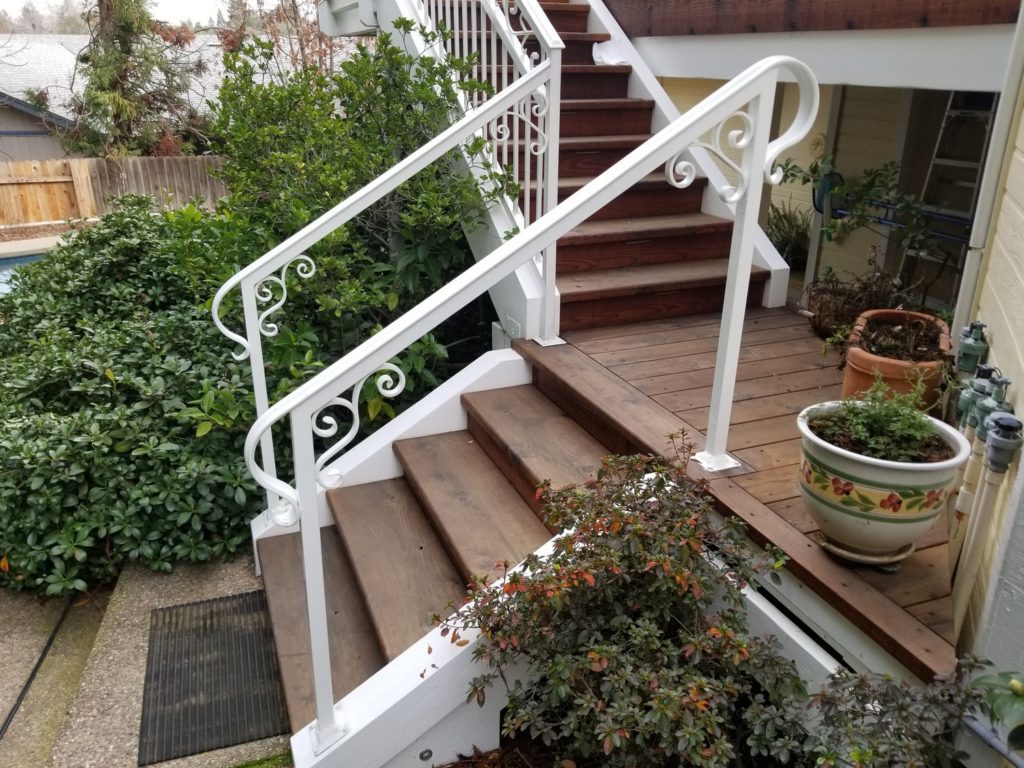
6. What is the cost and timeline for building my custom gate?
When planning to install a custom wrought iron gate for your property, it’s essential to consider both the cost and the timeline involved in the process. Custom wrought iron gates can be a significant investment, but they provide lasting beauty, security, and value to your property. Here are some factors that may influence the cost and timeline for building your custom wrought iron gate:
a. Design Complexity: The intricacy and complexity of the design you choose for your wrought iron gate will have a direct impact on the cost and timeline of the project. Elaborate and highly detailed designs will require more time, effort, and materials, which can increase the overall price. On the other hand, simpler designs may be more cost-effective and quicker to complete. When working with your fabricator, discuss your desired design and its implications on cost and timeframe.
b. Size and Dimensions: The size and dimensions of your custom wrought iron gate will also play a role in determining the cost and timeline. Larger gates with more extensive wrought iron work will typically be more expensive and time-consuming to build than smaller, simpler gates. Be sure to consider the size of your gate and how it may affect the overall price and timeline of the project.
c. Customization and Personalization: Custom wrought iron gates can be tailored to your unique needs and preferences, and the level of customization you require will impact the cost and timeline. Specialized features, such as personalized emblems, intricate scrollwork, or unique patterns, can increase the cost and extend the time required to complete the project. Be prepared to discuss your customization preferences with your fabricator and understand how they may influence the overall cost and timeline.
d. Material Quality: The quality of materials used for your wrought iron gate will affect the cost as well. High-quality, corrosion-resistant metals and coatings may be more expensive initially, but they can save you money in the long run by reducing the need for repairs or replacement. Discuss material options with your fabricator and choose the best quality materials that fit within your budget.
e. Fabrication and Installation: The expertise and experience of the fabricator and installer you choose for your wrought iron gate will play a role in the cost and timeline. Skilled professionals may charge more for their services, but their craftsmanship and attention to detail can ensure the longevity and durability of your custom wrought iron gate. Make sure to research and select a reputable fabricator and installer who can deliver the quality and service you expect.
f. Permits and Regulations: Depending on your location, you may need to obtain permits or comply with local regulations when installing a custom wrought iron gate. These requirements can add to the cost and timeline of your project. Be sure to research local regulations and factor in any associated fees or delays when planning your gate installation.
By carefully considering these factors, you can better estimate the cost and timeline for building your custom wrought iron gate. Although custom wrought iron gates can be a significant investment, their lasting beauty, security, and value make them a worthwhile addition to your property. Proper planning and communication with your fabricator and installer can ensure a successful project that meets your expectations in terms of cost, timeline, and quality.
7. Do you offer a warranty or guarantee on your work?
It’s important to have peace of mind that your investment is protected. One way to ensure this is by choosing a fabricator and installer who offer warranties or guarantees on their work. A warranty or guarantee reflects the confidence a company has in the quality of their craftsmanship and materials, and it can provide you with added assurance that your gate will stand the test of time.
A comprehensive warranty or guarantee should cover various aspects of the wrought iron gate, such as:
a. Craftsmanship: A quality fabricator and installer should stand behind their work by offering a warranty or guarantee on their craftsmanship. This can cover any defects or issues related to the construction and installation of your custom wrought iron gate. Be sure to inquire about the specific terms and conditions of the craftsmanship warranty, including its duration and any exclusions or limitations.
b. Materials: High-quality materials are essential for the durability and longevity of your wrought iron gate. A reputable fabricator should offer a warranty or guarantee on the materials used in your gate, ensuring that they are free from defects and will perform as expected. This may include warranties on the wrought iron itself, as well as any coatings, finishes, or hardware used in the gate’s construction.
c. Structural Integrity: A well-built wrought iron gate should maintain its structural integrity over time. Some fabricators and installers may offer a warranty or guarantee that covers issues related to the structural integrity of your gate, such as warping, bending, or rusting. Be sure to discuss the specifics of this warranty with your chosen company, including any conditions or maintenance requirements.
d. Additional Components: Custom wrought iron gates may include additional components, such as gate operators, access control systems, or decorative elements. Inquire whether the fabricator and installer offer warranties or guarantees on these components, as they can also impact the overall performance and longevity of your gate.
When discussing warranties and guarantees with potential fabricators and installers, make sure to ask about the specific terms and conditions, including the duration of the coverage, any required maintenance, and the process for addressing issues or making a claim. Additionally, request written documentation of the warranty or guarantee for your records.
By selecting a fabricator and installer who offer comprehensive warranties or guarantees on their work, you can have confidence in the quality and durability of your custom wrought iron gate. This added protection not only provides peace of mind but also ensures that your investment will continue to enhance the beauty, security, and value of your property for years to come.
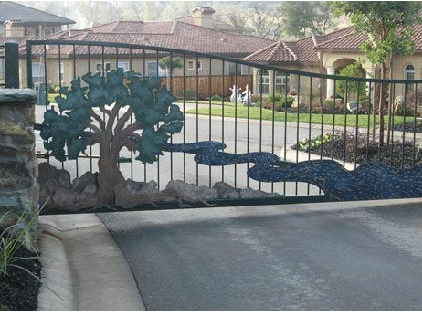
8. How will the gate be installed?
The installation process of a custom wrought iron gate is a critical aspect of ensuring its proper functioning, security, and longevity. By understanding how the gate will be installed, you can have confidence in the quality and craftsmanship of your investment. A professional and experienced installation team should follow a series of steps to ensure the optimal installation of your custom wrought iron gate:
a. Site Assessment: Before the installation process begins, the installation team should conduct a thorough site assessment to determine the specific needs of your property. This includes evaluating factors such as terrain, existing structures, and any potential obstacles that may impact the installation. The assessment ensures that the installation plan is tailored to your property’s unique requirements, ensuring a seamless and secure fit.
b. Foundation Preparation: A solid foundation is crucial for the stability and durability of your wrought iron gate. The installation team should prepare the site by excavating and leveling the ground, ensuring a stable and even surface for the gate’s support structure. Depending on the gate’s size and weight, concrete footings may be required to provide additional support and stability.
c. Support Structure Installation: Once the foundation is prepared, the installation team will install the support structure for your custom wrought iron gate. This may include the installation of gate posts, hinges, and other necessary hardware. The support structure should be securely anchored to the foundation, ensuring the gate’s proper alignment and function.
d. Gate Installation: With the support structure in place, the installation team will then proceed to install the custom wrought iron gate itself. This involves carefully positioning and attaching the gate to the support structure, ensuring proper alignment and smooth operation. The installation team should take great care during this step to avoid damaging the gate’s finish or components.
e. Gate Operator and Access Control Integration: If your custom wrought iron gate includes a gate operator or access control system, the installation team should expertly integrate these components during the installation process. This may involve installing the gate operator, wiring, and programming the access control system to ensure seamless and secure operation.
f. Final Inspection and Testing: After the gate and all associated components have been installed, the installation team should conduct a final inspection and testing to ensure everything is functioning correctly. This includes checking the gate’s alignment, operation, and security features. If any issues are identified, the installation team should address them promptly to ensure your complete satisfaction with the installation.
g. Post-Installation Support and Maintenance: A reputable installation company should provide post-installation support and maintenance services to keep your custom wrought iron gate functioning optimally. This may include periodic inspections, maintenance, and repair services, as well as guidance on proper care and maintenance practices for your gate.
By understanding the installation process and choosing a professional and experienced installation team, you can ensure the optimal performance, security, and longevity of your custom wrought iron gate. Proper installation not only protects your investment but also enhances the beauty and value of your property for years to come.
In conclusion, when building a custom wrought iron gate, asking the right questions can make all the difference in ensuring a successful project. From understanding design options and materials to discussing installation and warranty details, these questions will help guide you in selecting the best fabricator and installer for your unique needs. By investing time in thorough research and communication, you can ensure that your custom wrought iron gate will not only enhance the beauty and security of your property but also stand the test of time. We hope this blog post has provided valuable insights to help you make informed decisions throughout the process, and we encourage you to reach out to professionals in the field with any further questions or concerns.

